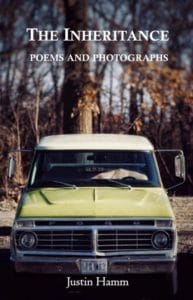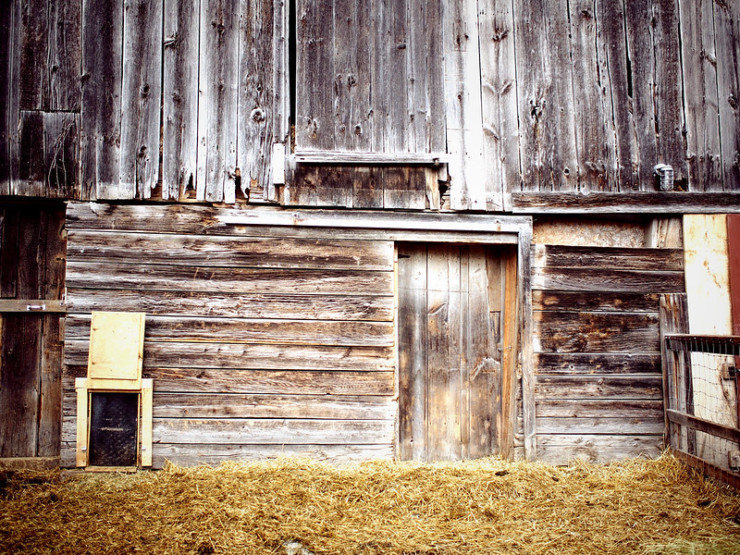I’m reading the poems of The Inheritance by poet and photographer Justin Hamm, and I realize how easy it would be to say “rural poems” and “regional poet.” It would be easy, and it would also be wrong.
I’m reading these poems, and thinking about the blond-brick 1950s ranch home where I grew up in suburban New Orleans, and the house on Fairfield Avenue in Shreveport where my father grew up (on the wrong side of the great dividing line of Kings Highway), and the house on Dauphine Street in the Lower Ninth Ward of New Orleans where my mother was born and lived until she was 27, a divorcee with a six-year-old child living with her mother.
Hamm writes about pelicans and cornfields and rusting plows and old barns and the people who lived and still live around them, yet I keep seeing images of suburbs and cities. He’s able to do that because his poems take you beyond the words and images immediately in front of you to the families and relationships where the words and images were born, where such a thing as memory first occurred. It started as such a little thing, but it ended up shaping your life and explaining why you eat everything on your plate and why a messy kitchen compels you to clean it.
In “The Pilgrim,” a man sees the light from the sunset “pouring into the shattered eyes” of his old farmhouse and considers the grave he dug for a stillborn child. “After the Argument” describes the damage inflicted on a family because of words. “Federico Garcia Lorca Blues” explains how the same color can be found in Andalusia, Chicago, and rural Arkansas. And the title poem is about a family legacy of physical abuse, and how could the grandfather so gentle putting his grandson on a horse have taught his mother to hit?
The collection comprises 20 poems and 14 photographs. And each photograph sits on the page like a poem—a work glove, the outline of a rural church, a train car, a harvested field, an abandoned and decaying farmhouse—and like each poem, tells at least one story.
While I live in suburban Missouri, I’ve spent enough time in both the rural parts of the state and also my own town to recognize the meaning of a storm.
Storm, Rural Missouri

announces itself by rustling
the distant corn,
the barns remain immutable
as weathered gray monks.
Without words, they pray
over the dog who sleeps
forever in his soil bed
beside the oranged relic
of a horse-drawn plow.
On rage the blood sugar wars.
The lust for nicotine continues.
The time-crumpled angels
pull on their Carhartt robes
and stand under wide awnings
as lightning unstitches the sky.
Here, every storm is forty nights
From stating the profound.

Justin Hamm
Hamm, a native of central Illinois, has published a photography book, Midwestern, and two previous poetry collections, American Ephemeral and Lessons in Ruin. His poems, stories, and photographs have been included in anthologies and published in a number of literary journals and magazines, including Nimrod, The Midwest Quarterly, Sugar House Review, Pittsburgh Poetry Review, and others. He’s also had several solo photography exhibitions. He now lives near what he calls “Mark Twain country,” which is northeastern Missouri.
The poems and photographs of The Inheritance are about the people, places, and things that shape us. They may now be ghosts, but they are powerful ghosts, with their own set of genes and DNA.
Photo by Y’amal, Creative Commons, via Flickr. Post by Glynn Young.
__________________________

“I require all our incoming poetry students—in the MFA I direct—to buy and read this book.”
—Jeanetta Calhoun Mish
- Poets and Poems: Peter Murphy and “You Too Were Once on Fire” - October 14, 2025
- “Your Accent! You Can’t Be from New Orleans!” - October 9, 2025
- Poets and Poems: Donna Vorreyer and “Unrivered” - October 7, 2025

Ali Nuri says
Beautiful review
L.L. Barkat says
This caught me by surprise (in a good way):
“Here, every storm is forty nights
From stating the profound.”
I’m guessing if it’s any indication regarding the rest of the poems, then they kind of sneak up on you (again, in a good way). I like a good surprise in a poem, that grows out of the poem, but wasn’t where you might have thought things were going.
Bethany R. says
Those lines punched out at me too.